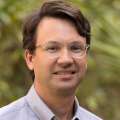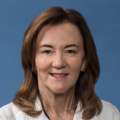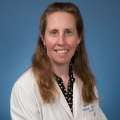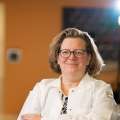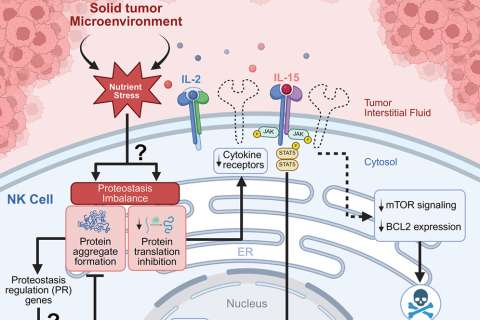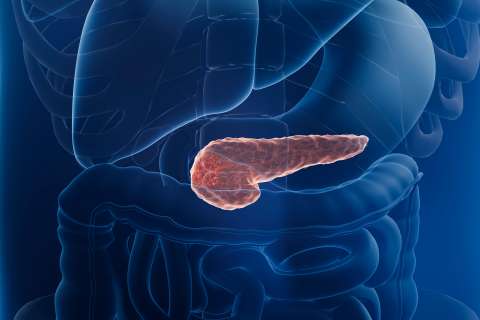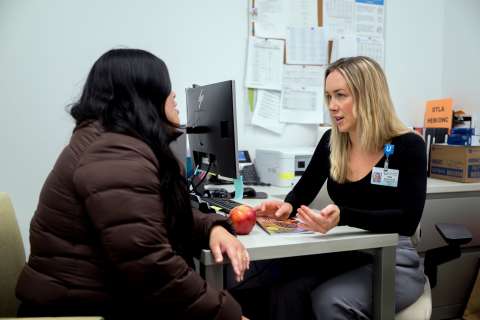UCLA Research
Researchers at the Eli and Edythe Broad Center of Regenerative Medicine and Stem Cell Research at UCLA have received more than $5.7 million in grants from the California Institute for Regenerative Medicine, the state’s stem cell agency, to fill in critical knowledge gaps in the biology of stem cells and regenerative medicine approaches and advance stem cell-based technologies for treating cancer, infertility, intellectual disability syndromes and cystic fibrosis.
The Foundation Awards, given to Dr. Gay Crooks, Kathrin Plath, William Lowry and Dr. Brigitte Gomperts, were announced at a CIRM meeting today.
Producing off-the-shelf CAR T cells for immunotherapy
Dr. Gay Crooks, professor of pathology and laboratory medicine and of pediatrics
Crooks’ $1.4 million award will fund her work to develop a gene-engineered platform that produces universal, off-the-shelf CAR T cells from induced pluripotent stem cells, or iPSCs, cells that can differentiate into any cell type in the body. In CAR T cell immunotherapy, T cells from a patient’s own blood are modified to carry chimeric antigen receptors, or CARs, to attack and kill tumor cells. This approach has shown to be a powerful treatment option for blood cancers, but gathering enough functional T cells from a patient’s blood can be difficult and manufacturing CAR T cells for each individual patient is time-consuming and inconsistent. Crooks and her collaborators are tackling these limitations by developing a gene editing approach to create an off-the-shelf, universal CAR T cell product that can be used with any CAR. CAR T cells produced from universal iPSCs could be used immediately to treat patients from all ethnic groups without the problem of immune rejection. If successful, the novel platform will make T cell immunotherapy more widely accessible for the treatment of blood cancers as well as of solid tumors like brain cancer and breast cancer.
Improving a stem cell-based embryo model to treat infertility
Kathrin Plath, professor of biological chemistry
Plath’s award of $1.4 million will support her efforts to develop an improved and scalable human blastoid model, a stem cell-based embryo model, which can provide insights into early human embryo development and how the process can go awry during pregnancy. Infertility affects approximately 1 in 8 couples of reproductive age in the United States. Although more couples are using in vitro fertilization, or IVF, to conceive, an estimated 60-70% of IVF cycles fail due to issues with embryo development, which is similar to natural human embryo mortality rates. Human blastoids offer a promising model to study the elusive stages of early human embryo development and gain a deeper understanding of infertility, early pregnancy loss and developmental disorders, but there’s currently high variation in the efficiency and scalability of blastoid formation. Plath and her team aim to improve the model by identifying a method that enables robust and uniform, consistent formation of human blastoids from diverse genetic backgrounds and both sexes.
Developing a gene therapy strategy for cystic fibrosis
Dr. Brigitte Gomperts, professor of pediatrics and of pulmonary medicine
Gomperts’ award of $1.5 million will support her efforts to develop a gene therapy approach that could be used as a one-time treatment for cystic fibrosis, one of the most common genetic disorders in the United States. Patients with this life-threatening disorder experience a buildup of thick, sticky mucus that blocks the airways and causes severe damage to the lungs, pancreas and other organs. Since cystic fibrosis is caused by a single gene defect, the disorder in theory represents a good target for genome-editing technology, but previous attempts to create a gene therapeutic strategy have been unsuccessful because airway basal stem cells, or ABSCs—the targets for long-lived gene correction in the impacted lungs—reside in a protected location in the deep regions of the airway wall. Gomperts will collaborate with fellow UCLA Broad Stem Cell Research Center members Dr. Steven Jonas, an expert in gene and cell delivery, and Dr. Donald Kohn, a gene therapy expert, to overcome this barrier by designing a suite of nanotechnology-enabled tools that could target ABSCs without causing injury to the airways.
Defining the source of dysfunction in intellectual disability syndromes
William Lowry, professor of molecular, cell and developmental biology
Lowry’s $1.5 million award will fund his work to uncover why intellectual disability, or ID, leads to defects in neurons. ID syndromes represent a large group of diverse disorders with no cures that affect hundreds of millions of people worldwide and approximately 6.5 million people in the United States. While extensive evidence has shown that many ID syndromes share a variety of characteristics like intellectual disability, facial dysmorphia and epilepsy, there are no definitive molecular connections that link mutations in regulatory proteins—the workhorses of genome management—to these observable patient traits. Using induced pluripotent stem cells derived from patients with several distinct ID syndromes, Lowry and his collaborators have found that DNA damage and premature aging likely play important roles in the development of ID syndromes. Identifying a common pathway for the development of ID syndromes will provide researchers with a key target for therapeutic interventions.

